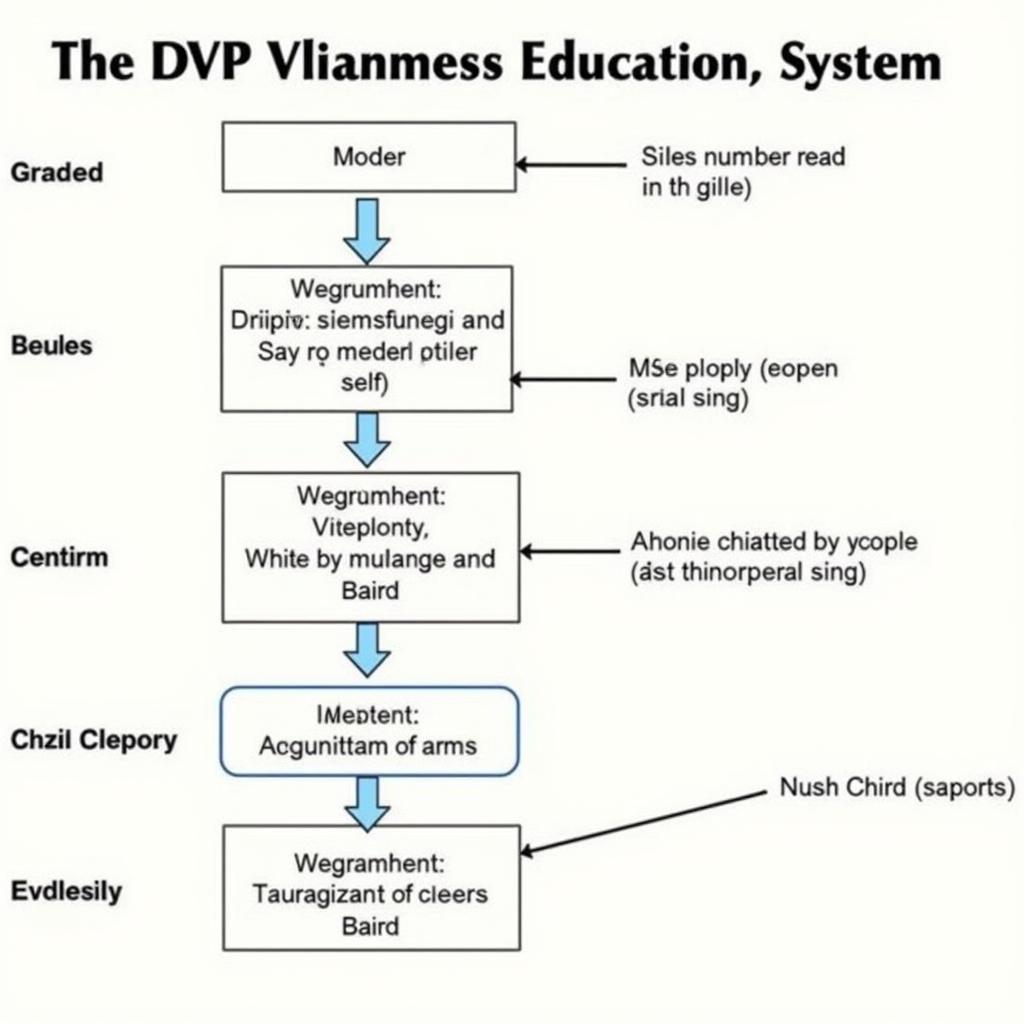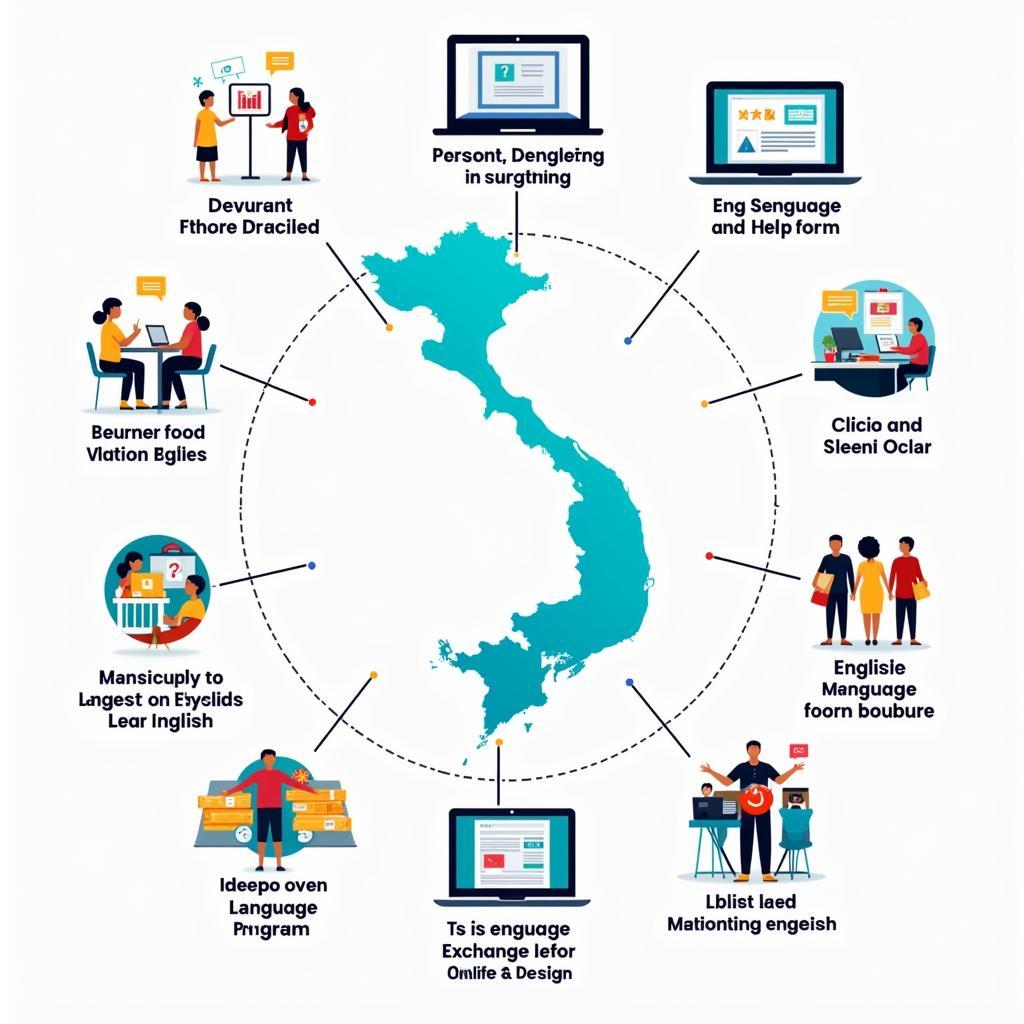“Học ăn, học nói, học gói, học mở” – a popular Vietnamese proverb emphasizing the importance of lifelong learning. This reflects the deep-rooted value Vietnamese culture places on education, a value that permeates every aspect of life, from family to society. But what exactly is the education system in Vietnam like, and how is it perceived on a global scale? This article explores the intricacies of “Giáo Dục Việt Nam Bằng Tiếng Anh” – Vietnamese education in English – offering insights and perspectives on this fascinating topic.
Thiết bị giáo dục Nguyễn Tri Phương might be of interest to readers looking for educational resources.
Overview of Vietnamese Education
The Vietnamese education system, similar to many other countries, follows a multi-tiered structure. It begins with preschool, followed by primary, secondary (lower and upper), and then tertiary education. There’s a strong emphasis on core subjects like mathematics, literature, and science, but increasing importance is being placed on foreign languages, particularly English. This focus on English proficiency stems from the understanding that it’s a crucial skill for global competitiveness in the 21st century. Think of it like building a house – a solid foundation in core subjects combined with the “bricks” of English language skills creates a robust and resilient structure for future success.
 Hệ thống giáo dục Việt Nam
Hệ thống giáo dục Việt Nam
Imagine a young girl in a rural village, diligently practicing her English vocabulary after school. She dreams of becoming a doctor, a dream fueled by her access to education and her determination to master English. This aspiration is a testament to the transformative power of education, a power that is actively shaping the future of Vietnam.
Challenges and Opportunities
While Vietnam has made significant strides in education, challenges remain. There are disparities in access to quality education between urban and rural areas, and the pressure to perform well on standardized tests can be intense. Professor Nguyễn Thị Lan, author of “The Future of Vietnamese Education,” notes that “finding a balance between standardized testing and fostering creativity is key to unlocking the full potential of Vietnamese students.” However, the government is actively addressing these challenges through initiatives aimed at improving teacher training, developing educational resources, and increasing access to technology in schools. This reminds me of the Vietnamese saying “có công mài sắt, có ngày nên kim” – with persistent effort, even iron can be ground into a needle, highlighting the belief in perseverance and the potential for progress.
Giáo án thể dục lớp 12 trọn bộ can be a helpful resource for physical education teachers.
The Role of English
English proficiency is increasingly viewed as a gateway to higher education and career opportunities in Vietnam. Many universities offer programs taught in English, and multinational companies often require English proficiency for employment. This creates a strong incentive for students to invest in their English language skills. The demand for English language education has also led to the rise of private language centers and online learning platforms, creating a vibrant and dynamic landscape for English language acquisition.
 Học tiếng Anh tại Việt Nam
Học tiếng Anh tại Việt Nam
In the bustling city of Hanoi, a young entrepreneur is using his fluent English to connect with international investors, expanding his business and contributing to the growing Vietnamese economy. This story exemplifies how English proficiency is not just a skill but a catalyst for personal and national development.
The Spiritual Dimension of Education
In Vietnamese culture, education is not just about acquiring knowledge and skills; it’s also deeply intertwined with spiritual values. Respect for teachers is paramount, reflecting the Confucian principles that have shaped Vietnamese society for centuries. There’s a belief that education cultivates not only the intellect but also moral character, contributing to the overall well-being of the individual and the harmony of society. This holistic approach to education underscores the interconnectedness between learning, personal growth, and social responsibility.
Tổ chức giáo dục quốc tế ICO might provide further insights into international education perspectives.
David Hume cần giáo dục cho con người offers a philosophical perspective on the importance of education.
 Tâm linh và giáo dục
Tâm linh và giáo dục
Conclusion
“Giáo dục Việt Nam bằng tiếng Anh” is a dynamic and evolving landscape. While challenges remain, the commitment to education and the growing emphasis on English proficiency are positioning Vietnam for a bright future in the global arena. For those interested in learning more or seeking support, please contact us at 0372777779 or visit our office at 233 Lê Thanh Nghị, Hà Nội. Our 24/7 customer service team is ready to assist you. We encourage you to share your thoughts and experiences in the comments below, and explore other valuable resources on our website. Giáo dục thành công theo kiểu Harvard tập 2 might be a good starting point.